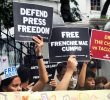2018 proved to be one of the most challenging for independent Philippine media. Yet it has also been a year of affirmation.
This year, the already tense relations between the media and President Rodrigo Duterte took a decided turn for the worse with the January decision of the Securities and Exchange Commission to revoke the license of online news outfit Rappler, one of the three media companies he had singled out for vicious verbal attacks and threats, for allegedly violating the constitutional prohibition on foreign ownership of mass media as well as the Anti-Dummy Law.
Although the case remains on appeal, Duterte pressed on the attack on Rappler by banning its Malacañang reporter, Pia Ranada, from the Palace and from covering all of his functions. The ban was later extended to include all Rappler correspondents and contributors.
By yearend, Rappler and its CEO, veteran journalist Maria Ressa, were facing multiple tax evasion cases lodged by the Department of Justice and the Bureau of Internal Revenue, charges both local and international media and free expression groups denounced as “politically motivated” and part of efforts to silence the news organization for its critical reportage of a president who cannot abide criticism and dissent.
Recently, Duterte also stepped up his attacks on broadcast network ABS-CBN, repeating his threat to block the renewal of its franchise, which expires in 2020.
The murder of journalists continued without letup, beginning with the April 30 killing of Edmund Sestoso in Dumaguete, Negros Oriental, followed by – just days after then presidential spokesman Harry Roque claimed, on World Press Freedom Day, May 3, that media killings had gone down under Duterte – Carlos Matas of Labangan, Zamboanga del Sur on May 12, Dennis Denora of Panabo, Davao del Norte, and Joey Llana of Daraga, Albay, who died July 20, just days before Duterte’s third state of the nation address.
The four brought to 12 the tally of journalists slain under Duterte and to 185 since 1986.
But the open hostility of an admittedly still popular president who considers media’s scrutiny of his governance, or lack of it, as a personal affront has led to a significant spike in threat levels and harassment of media practitioners, especially online where journalists are constantly bashed by trolls, bots and Duterte supporters.
And this administration that practically revels in insulting what it calls “presstitutes,” also employs paid hacks and propagandists who amplify its messages of hate in newspaper columns, the airwaves and social media, often also using these venues to send prompts to launch concerted attacks on critics or attempts to drown the truth in a flood of lies.
In all, media groups have documented at least 99 attacks and threats against the press from July 1, 2016 to October 31 this year. But these numbers are most likely way below the actual count since many incidents, especially of online harassment and threats received, go unreported.
And these are just the external threats Filipino journalists have to deal with.
There are also the insidious and mostly unrecognized internal threats, especially the worsening work and welfare conditions for media workers as contractualization increasingly becomes the norm in many workplaces. This problem has had adverse impacts not only on professionalism and ethics but also on safety and even the quality of journalism.
But Filipino journalists have stood up to the threats and challenges, jealously refusing to relinquish their independence and continuing to deliver information to the people. In fact, akin to colleagues who defied the Marcos dictatorship’s efforts to silence the truth, many journalists have focused on covering this administration’s excesses as a means of record-keeping and assigning accountability.
Media groups continue with efforts to improve journalists’ safety as well as help them seek better welfare and working conditions.
The dedication and resilience of Filipino journalists have earned the respect and recognition of their peers around the world.
Among the notable awards are those accorded photojournalists and Reuters for their tireless documentation of Duterte’s murderous “war on drugs,” the press freedom award for independence given by Reporters Without Borders to former NUJP chair Inday Espina-Varona, and Maria Ressa’s awards and her inclusion in the “Guardians,” TIME Magazine’s Person of the Year for 2018.
These awards are as much a recognition of independent Filipino journalists’ courage and dedication as they are testaments to their recipients’.
But more than awards and international recognition, the real validation of the Filipino journalists’ efforts to uphold the truth can be seen in the growing numbers of our people who are pushing back against a government that has wantonly violated their basic rights and liberties.
This gives us the confidence to predict that next year and, yes, the years to come, a Philippine press that remains independent despite efforts to silence it and a truly informed and, therefore, empowered citizenry will ensure that democracy will not only survive but recover lost ground.
National Directorate





![[ANALYSIS] A different drug war](https://davaotoday.com/wp-content/uploads/2024/09/1000019103-110x100.png)




